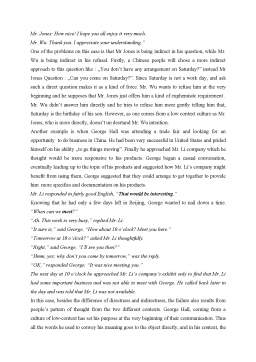Extras din referat
Context is very important in all communication. There are a lot of differences across cultures. One of the main distinction between cultures are the low and high context cultures.
A high context communication is one in which most of the information is either in the physical context or internalized in the person. Where the low context communication represent the opposite,so the information is vested in the explicit code.
Hall observed that "meaning and context are inextricably bound up with each other" (Hall, 2000, p. 36), and suggested that to understand communication one should look at meaning and context together with the code (for exemple, the words themselves). So when we speak about context we refer to the situation, background connected to an event. When communication is high context we don’t speak only about non-verbal communication, we also speak about the time and situation in which communication takes place, and also we speak about the relationship between interlocutors.
Low context communication is identified as direct, precise, dramatic , open and based on feelings or true intentions.
Now I will speak about some cases based on Hall’s view.
So, Hall speaks about the people which uses low context communication style are „expected to communicate in ways that are consistent their feelings” whereas a person which use the high context culture will set the context and the setting and let the message evolve without refering to the problem directly. So to conclude the High context tend to use indirect and vague language, whereas the Low context culture tend to be use more direct and explicit approach to be sure that the listener receives the message exactly as it was sent. Here is a good example of communication failure between these two contexts.
„Mr. Jones: It looks like we’re going to have to keep the production line running on Saturday.
Mr. Wu: I see.
Mr. Jones: Can you come in on Saturday?
Mr. Wu: Yes. I think so. (with a hesitative tone )
Mr. Jones: That’ll be a great help.
Mr. Wu: Yes. Saturday’s a special day, did you know?
Mr. Jones: How do you mean?
Mr. Wu: It’s my son’s birthday.
Mr. Jones: How nice! I hope you all enjoy it very much.
Mr. Wu: Thank you. I appreciate your understanding.”
One of the problems on this case is that Mr Jones is being indirect in his question, while Mr. Wu is being indirect in his refusal. Firstly, a Chinese people will chose a more indirect approach to this question like : „You don’t have any arrangement on Saturday?” instead Mr Jones Question : „Can you come on Saturday?”. Since Saturday is not a work day, and ask such a direct question makes it as a kind of force. Mr. Wu wants to refuse him at the very beginning and he supposes that Mr. Jones just offers him a kind of euphemisitc requirement . Mr. Wu didn’t answer him directly and he tries to refuse him more gently telling him that, Saturday is the birthday of his son. However, as one comes from a low context culture as Mr. Jones, who is more directly, doesn’t un desrtand Mr. Wu intention.
Another exemple is when George Hall was attending a trade fair and looking for an opportunity to do business in China. He had been very successful in United States and prided himself on his ability „to ge things moving”. Finally he approached Mr. Li company which he thought would be more responsive to his products. George began a casual conversation, eventually leading up to the topic of his products and suggested how Mr. Li’s company might benefit from using them, George suggested that they could arrange to get together to provide him more specifics and documentation on his products.
Mr. Li responded in fairly good English, “That would be interesting.”
Preview document
Conținut arhivă zip
- Intercultural Communication Examples.doc














